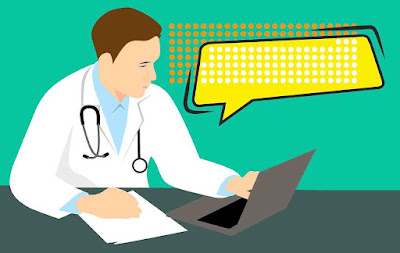Technological applications in medicine
Research interest in medical and healthcare domains
has seen substantial growth in the last decade. Technological advances, mainly
in robotics, are being used to perform surgery. They also have the potential to
enable the improvement of new treatments for a large variety of diseases, enhancing
patients’ health outcomes. Today’s article aims at proposing some of the most
important achievements of medical technology used to improve human health and
well-being. Here we go!
Robotics application areas in healthcare
Robots are one of the first medical
technologies used to treat and prevent injury. As mentioned above, telerobotic
systems are being used in several health domains such as surgery. As expected,
convalescence and the management of lifelong cognitive, social, and physical
disorders require behavioral therapy, consisting of physical and cognitive
exercises. However, because of the fast-growing demographic trends of many affected
populations, the available health care needed to provide supervision and
coaching for such behavioral therapy.
And that is exactly where robots are invited in
the race. In fact, some experiments have demonstrated that robotic systems can
provide therapy and coaching care with nearly no supervision by human
therapists. Furthermore, robots can be used to obtain data from biological
systems with accuracy, enabling us to gain quantitative information about both
physical and social behavior.
Artificial Intelligence applications in medicine
Artificial Intelligence (AI) tackles on several
areas in healthcare. The major trend for AI here will be the usage of machines to evaluate huge amounts of patients’ data and health information. This will
actually be possible by creating algorithms and programs that can mimic human
thoughts and needs. As a matter of fact, given a patient’s medical archives
along with their symptoms, physicians may give the adapted medications and treatments
based on the information provided by the programs.
Of course, the physicians will always have the last
say but it will become easier to have the patients’ health information safely
recorded. Having records at their disposal, healthcare leaders will be able to
considerably improve their patients’ outcomes and increase by the same way the healthcare
services satisfaction. These programs developed with the help of Artificial
Intelligence will surely revolutionize healthcare services.
Computing and physical enhancements
Cameras are getting cheaper and image analysis
algorithms are being enhanced. The networking infrastructure has continuously
been improved. For one purpose or the other, parts of our lives will likely be captured by the recent sensors which provide significant
information. Combined with the rapid progress made in medical imaging and the
possibility of using other biosensors, it becomes technically realistic for
each of us to have a detailed record covering nutrition, behavior, and
physiology medical data. Thus, we will have a database more detailed and
broader in scope than anything we have seen in the past.
Such a database is even going to reach its full
potential in healthcare. Along with the development of the 5G network, this will
get even easier to expand medical services across the world. Plus, more
connected devices will be accessible; transmitting medical data instantaneously
with zero latency along the way is now a reality. The marriage between 5G and
medical technology will be of great benefit in healthcare. But that’s just
the beginning!
New methods of treatments
The improvement of various medicine and
vaccines, mainly in the context of Covid-19, in less than a year is seen as one
of the greatest achievements of all time. The process has involved many other
innovations as medical trials are concerned. An association with pharmaceutical
companies would lead to a bright future in new methods of drugs development.
Nanomedicine, also known as the medical application of nanotechnology, operates on
everything related to the atomic and molecular scale. Working on things of such
a small size, this technology has great potential though. It can actually be
used in imaging, diagnosis, sensing, of course using medical devices. For years
now, scientists are experiencing a new way of using nanotechnology to target
individual cells. Moreover, they are trying to find whether nanoparticles can be
used as treatments for tumors, or fight viruses and other bacteria.
Digital therapeutics in medicine
Also, taking into account some patients chronic
illnesses along with the changes and fees their care will include, digital
therapeutics are willing to fill a significant role. Digital therapeutics are usually
prescribed by a physician to a patient based on the latter health condition. This
includes a group of software programs that can be accessed as apps on the
patient’s smartphone, tablet, and computer.
As patients use the apps, data and information
related to their health condition or well-being are constantly reported to the doctor.
The doctor may now monitor the patient without having to settle an appointment
regularly. Some medical conditions that are perfectly suitable with digital
therapeutics include diabetes, cancer, asthma, insomnia, anxiety, and much more.
Digital assistants VS pacemakers
The use of digital assistants like Google Home has
considerably enhanced the way people interact with technology, in a positive way!
And seemingly, these digital assistants will be helping in healthcare as well.
Actually, several designers of health records systems have integrated voice-enabled
assistants into their software and devices. The latter is constructed in such a
way that they can listen to and understand the conversations between patients
and doctors. A great deal though but it is worthy and apparently working!
Another medical technology that has been used
for years now is the pacemaker. Today, pacemakers are getting better. Delivering
electrical impulses to heart muscles, they can prevent heart arrhythmias or
rather treat them. They can even be used remotely, which was not the case
decades ago. And that’s just the beginning! Smarter pacemakers are being
developed since 2021, enabling their usage with Bluetooth technology. As a
result, smarter pacemakers can be linked to smartphones as apps. It will thus
become easier for patients to use and understand how they work. Once more, monitoring
patients is made more accessible; doctors can provide healthcare remotely.
All those technological innovations made in
medicine are just a piece of what is to be done. As technology taken as a whole
is continuously progressing, medical technology will also follow the pace!





